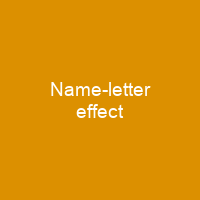The Name-Letter Effect: A Psychological Phenomenon Explained
Imagine a world where the letters in your name hold more significance than you ever realized. This is exactly what the name-letter effect suggests—a phenomenon that has intrigued psychologists and researchers for decades.
The Discovery of the Name-Letter Effect
In 1985, Jozef Nuttin made a groundbreaking discovery when he noticed his preference for license plates containing letters from his own name. This observation led to a series of experiments that would uncover a fascinating psychological phenomenon.
Initial Experiments and Findings
Nuttin’s first experiment involved 38 Dutch-speaking girls and 98 university students, who showed a significant preference for letters in their own names over others. This initial finding sparked further research to explore the name-letter effect across different languages and cultures.
Replicating the Name-Letter Effect
The name-letter effect has been replicated numerous times with subjects from various countries, ages, genders, and alphabets. In 1987, a second study was conducted using data from 1984-1985, involving Hilde Sas’s help to test the effect’s generality across different languages.
Global Consistency of the Effect
The results were consistent: in 2,047 subjects participating, the name-letter effect was observed. Across languages and letters, the average probability of a letter being chosen as one of the six preferred letters was 0.30 for name letters and 0.20 for other letters.
Initials vs. Non-Initials
The effect was strongest for initials but also present without them, indicating that it extends beyond just the first letter of one’s name. This finding suggests a deeper psychological connection between people and their names.
Exploring the Causes of the Name-Letter Effect
Several explanations have been proposed to understand why people prefer letters in their own names, but many have been ruled out. Mere exposure, subjective frequency, mastery pleasure, and evaluative conditioning are not strong enough to explain the effect.
Automatic Self-Evaluation Processes
The most probable cause is automatic self-evaluation processes leading to mere ownership effects. People tend to like their own name letters because they feel a sense of ownership over them, which in turn influences their preferences.
Implications for Real-Life Decisions
This effect has real-life implications, such as people favoring brands matching their initials or donating to charities with names sharing the same initial letter. It’s a subtle yet powerful influence on our decision-making processes.
The Name-Letter Effect in Different Contexts
Research has shown that the name-letter effect is not limited to just initials but extends to other attributes connected to the self, such as birthday numbers. This suggests a broader psychological phenomenon at play.
Stability and Automaticity of the Effect
The preference for name letters remains stable over time, with no significant changes between two ratings within four weeks or seven days. This supports the theory that the effect is an automatic process rather than a conscious one.
Critiques and Controversies
While the name-letter effect has gained widespread recognition, some critics argue that it only applies to low-stakes decisions and may not influence major life choices like career paths. Studies linking performance to initials have been criticized for potential confounding variables.
The Future of Research on Name-Letter Effect
As research continues, the name-letter effect remains a fascinating area of study. It challenges our understanding of self-identity and decision-making processes. Whether you’re choosing a brand or making a donation, remember that your name might be subtly influencing your choices.

The name-letter effect is a powerful reminder of the subtle ways in which our identities shape our preferences and decisions. As we continue to explore this phenomenon, it will be interesting to see how it influences various aspects of our lives.
You want to know more about Name-letter effect?
This page is based on the article Name-letter effect published in Wikipedia (retrieved on November 30, 2024) and was automatically summarized using artificial intelligence.






